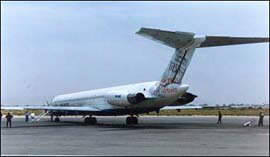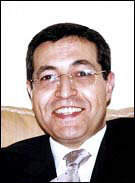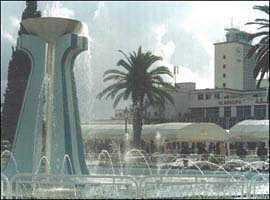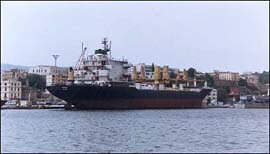 TRANSPORTS TRANSPORTS |
 At the forefront of liberalization At the forefront of liberalization |
The transport sector is where the process of liberalization has mostly advanced. From 1998 to 2001, three new laws have been passed to emphasize this new tendency: the new code of air navigation, the new maritime code and the law pertaining to transport on land. One must recognize that the transport sector is vital to the economy of the country because it affects, almost directly, all fields of activity. As for the majority of other areas of the Algerian economy, the transport sector must undergo a structural and legal reform to adapt to the new requirements of a more liberal market, concerned about the well being of its citizens and the smooth running of economic activities. Furthermore, to stimulate investment, it is essential to consolidate and extend existing infrastructures. Although it requires improvements, the Algerian network is large and diversified. The road network dominates largely, ensuring 90% of all internal traffic, while rail transport plays an important role in the servicing of ports, industrial zones and large cities. Despite its high potential, the use of rail is limited to 7%-8% of the transport market, including both cargo and passenger transport. No doubt, terrorist attacks on rail convoys bear no little responsibility in this situation. Maritime transport, on the other hand, with 68 merchant ships, has the monopoly of foreign trade. Finally, air transport is significantly increasing in terms of activity.
 Domestic Flights: An Increase of almost 50% in 2001 Domestic Flights: An Increase of almost 50% in 2001 |

With regards to air transport, the private company Khalifa Airways has confirmed its status as a direct competitor of the national company Air Algérie. The public company, which has a period of two years to open its capital, is in contact with BNP Paribas bank for advice to lead it through this process. It has already signed a strategic alliance agreement with Alitalia. Mostly however, it is Air Algérie's partnership with Khalifa Airways that gives a glimpse of the two companies' determination to settle in the European market and their will to keep their domestic market shares.In fact, the arrival of Air Lib and Air Littoral has stimulated competition on French destinations, which represent the greatest share of international flights from Algeria.

"2001 has witnessed a noteworthy evolution, mainly in domestic flights. With the arrival of Khalifa we have witnessed a significant boom" explains Mr. Ait Si Ali Mouloud, general manager of ENNA (National Company for Air Navigation). With numbers to back this statement, Mr. Daoud, an executive at ENNA confides that after the events of September 11, international nonstop flights have decreased by 15 %. "This tendency slowed down during the first semester of 2002. As regards national flights for 2001, he noted a very high increase of about 45%-50%." The general secretary of Khalifa Group, Mr. Rachid Amrouche agrees: "from the onset, our strategy was to give priority to the domestic market first then to the international market. We have now achieved a network throughout Algeria. As for international flights, we are still pursuing the realization of our objective, which consists in following the economic movements of Algeria and Algerian immigrants. Hence, after having been authorized to stopover in a number of French and Spanish cities, as well as Johannesburg and Dubai, we have just been authorized to service Casablanca, Tunis, Damascus, Mecca, Istanbul, Milan and London. We also plan to cover North America shortly."
The EGSA in Oran, which ensures the management of 10 airports in the western region of Algeria, by way of general manager Mr. Djellat, witnesses this market expansion, which represents a growth factor for his company. "Two years ago we built a new extension to the airport of Adrar, this enabled us to double passenger welcoming capacities. Furthermore, last year we started work to increase the capacity of Bechar airport. This modest realization undertaken by our own means enabled us to double the passenger processing capacity. Finally, with regards to current realizations, we started on 1 April on the extension of the second western platform in Tlemcen, which was inaugurated 20 August of this year. We have thus been able to free some space at Oran's international terminal, which will generate resources enabling us to self-finance and realize other projects on various platforms with lower revenues." The EGSA of Oran will not act alone adds Mr. Djellat: "we issued a call for tender for the realization of the terminal zone in its entirety, the terminal, the control tower and other structures for the various operators. With regards to the airport of Mascara, we have issued a call for tender with other airline companies. We only resort to partnerships when our experience is not sufficient. We have had our first partnership experience with companies in the field of catering and management".

This materialized for the first time in the field of free shops, very sought after by our passengers. The deal was made with Ed Mauer, a Swiss company for Oran's and Tlemcen's international airports." Finally, one must bear in mind that a call for tender was issued on 12 July 2001 for the management and operation concession of Algiers Houari Boumediène airport. It is the first time that a public infrastructure is conceded to a private operator in Algeria. The operator's mission will be to finish construction of the new terminal, for which work started more than 10 years ago. This new terminal will increase the airport's capacity to about 8 million passengers per year. Algiers airport recorded last year traffic of 4.3 million passengers, with a considerable increase in domestic traffic (+40.8% in 2001 compared to 2000) as well as international traffic (+17.6%).
|  The Maritime Sector is Calling for Investors The Maritime Sector is Calling for Investors |
With near monopoly of foreign trade, maritime transport had to adapt to the new context of international trade. It is within this framework that the maritime code has been systematically reviewed to adapt to the new market requirements. The modernization of port facilities is another requirement in this context of globalization. With regards to port management reorganization, three authorities have been put into place to take over from the Government. It has been specified that from now on, private and public trade operations will be competitive. The maritime sector is therefore open to private initiative since the implementation of the new reforms. However, investors remain wary regarding this sector with regards to the level of credits to be mobilized in order to create maritime transport services. The market is presently shared by four operators and ten public port companies.

It would be relevant to mention EPAN (Port Company of Annaba) as it plays a key role in the regional industrial pole within this sector, which is dominated by the two industrial groups Asmidal and Ferphos. According to Mr. Salhi, general manager of EPAN, "All of Algeria's ports and port companies are about to undergo a strategic adaptation. Commercial activities (stevedoring and towing) will be open to competition and can be handled by other companies. The management of public property will be under the responsibility of public authorities." The development program of EPAN deals with the development of infrastructures and facilities. "We have just realized a multipurpose terminal with the help of the World Bank. Furthermore, a maintenance and renovation program for our base infrastructures has been established focusing on dredging activities. Handling and towing activities will probably be dealt with in the very near future."
Giving more examples related to the opening of the maritime sector, Mr. Nazef, Secretary General at the ministry of transportation asserts that: " As for the ports, there's a tendency towards liberalization and opening up of the sector clearly illustrated by the offering of concessions for selling spaces within the ports precincts". In this respect, the port of Djenden is particularly attractive, notably thanks to its assets. As far as the travelers sector is concerned, Mr. Nazef also notices that the new maritime code offers the possibility to use a ferry other than that of the National Company of Maritime Transportation (ENMTV) ; "you can still travel with the SNCM Corse Mediteranéé or even seize the opportunity for investors , willing to invest in the sector, to promote their own maritime passenger transportation company next to the ENMTV". The port of Algiers is considered as the first commercial port in the country with an average of 6 million tons of traffic a year. The port covers nearly 35% of the country's merchandise traffic , essentially imports. Almost 2200 commercial vessels come alongside the port entrance a year. Finally, the port of Oran is the one recording the highest average of passengers in Algeria.
 Proportion of the Downloaded Products Proportion of the Downloaded Products |

As for the railroad sector, there is no record of any contribution from the private sector. Indeed, this sector of activity is solely covered by a state owned company SNTF (National Railroad Transportation Company in its French acronym). This latter is the only operator in the sector until a decision is taken to put into concession the railroad network. A special program has been adopted to upgrade the railroads which presents wide perspectives whether at the level of merchandise transportation or that of passengers.
Beside the railroads, and since its liberalization, road transportation has noticed an unprecedented growth. However, it is in fact characterized by a higher demand and a certain anarchy. This is mainly due to the use of non-complying equipment which urged the concerned authorities to implement a more severe legal framework.
 Major Projects Major Projects |
Speaking of major projects , Mr. Nazef talks about the tramway and the subway of Algiers as being two important opportunities for partnerships. " In general, the policy of the urban transportation is completely liberal. There's no monopoly. On the contrary, we wish a larger contribution of the private sector or a combined participation public/private". However, the project is still under study because of the necessary considerable investment requested due to the broken relief of the Algerian capital. This study should consider the present project shape and all the possibilities in order to conciliate with the social, structural and economic imperatives necessary to its achievement. Beside this project, the project of the railroad network extension is also under study.
Within the stream of the market liberalization, the ministry of transportation is particularly careful about the enhancement of its infrastructures. Indeed, a program of stimulation concerning all the sectors of this ministry has been established .This program seriously considers the necessary conditions for a safe and efficient transportation network implementation. In fact, airports, ports, railroads, air and marine transportation should adapt to the new market economy. The efficiency, quality of the services provided and the safety conditions should perceptibly improve and applying at the same time competitive costs. All these measures meant for adaptation and restructuring are real appeals to a technical and financial support from national or international private investors. |

